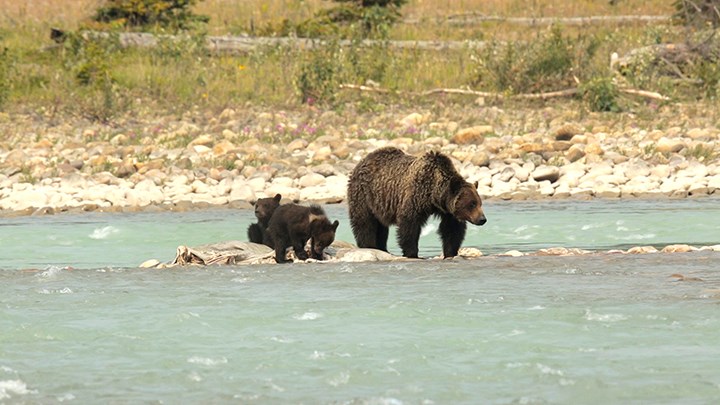
by Evan Matthews | [email protected]
A French tourist has been fined for disturbing the family of grizzlies that fed on an elk carcass for several days near Old Fort Point this summer.
Francois Rivalland, a 54-year-old doctor from France, was fined $500 for operating an unmanned air vehicle, or drone, within a national park, and $1,500 for disturbing wildlife, in Jasper Provincial Court last Thursday.
He was charged by a park warden under the Canada National Parks Act on July 27.
That day, witnesses spotted a drone flying above Old Fort Point. Earlier in the week, Parks Canada had set up a closure for public and animal safety after a grizzly sow and her two yearling cubs were seen feeding on an elk carcass along the Athabasca River.
Though the trail in the area was closed, Parks encouraged the public to view from a safe distance — even setting up a viewing area — the court heard.
With no signage to suggest otherwise, defence counsel Laurie Rodger told the court Rivalland heard about the bears, saw an opportunity, and took it.
Crown prosecutor Ian Ross was quick to remind the court that ignorance of the law is not a defence. He pointed out Rivalland should not have been flying the drone at all, as federal legislation states foreign nationals are prohibited from flying drones anywhere in the country. Ross argued Parks’ especially stringent regulations would make Rivalland’s status as a foreign national an aggravated circumstance.
According to the Crown witnesses saw Rivalland fly the drone near the bears. The sow stood up on her hind legs, sniffing at the drone, before electing to bring her cubs to safety underneath a nearby tree. Finally, Rivalland’s drone landed on the south side of the Athabasca River, witnesses allege.
Ross told the court studies show grizzlies respond to drones in the form of increased heart rate, which is a fear-based response.
Rodger told Judge Norheim that on the day in question those same witnesses expressed concern to Parks staff, and to Rivalland himself. As soon as members of the public made Rivalland aware, he began to pack it up.
Then the warden approached him. The Crown alleged Rivalland indicated to the warden he wanted to take photos of the bears, but did not fly directly overtop of them.
After reviewing content stored on the drone’s camera, the warden found the first photo revealed bears feeding on the elk from a close proximity, from some 40 feet overhead.
Parks seized Rivalland’s drone — valued at $1,500, which he still (as of the court date) had not received back.
The Crown was seeking a $4,000 fine from Judge Donald Norheim, referring to a recent case in which Judge Norheim issued a $1,500 for breaching a caribou closure.
Grizzlies are designated as a “threatened” species in Alberta. Grizzlies could become extinct in the next 50 years, according to the Jasper Environmental Association, which argues their habitat and their travel corridors within the park must be protected from human disturbance.
It’s estimated that up to 20,000 grizzly bears remain in western Alberta, the Yukon and Northwest Territories and British Columbia, according to Parks Canada.
Judge Norheim said he was looking at Rivalland’s moral culpability with the main point being the severity of Rivalland’s disturbance to the bears.
“Ignorance is not a defense, but it speaks to moral culpability. But there are still legal liabilities,” said Judge Norheim. “We have a tourist unaware of the especially stringent rules in a Canadian national park,” he said. “The bears fed for another day, so it’s not like it was driven from its food source.”
Judge Norheim told the court it was reasonable to believe Rivalland didn’t personally believe he was violating any boundaries established by Parks Canada, and while running the drone was intentional, Rivalland did not intend to disturb the bear or disregard national park regulations.
Judge Norheim suggested the Public Prosecution Service of Canada’s request of $4,000 was out of context and excessive, perhaps due to not being familiar with Parks Canada regulation.
Judge Norheim sentenced Rivalland to fines totaling $2,000, and asked Parks to return the drone to Rivalland.



